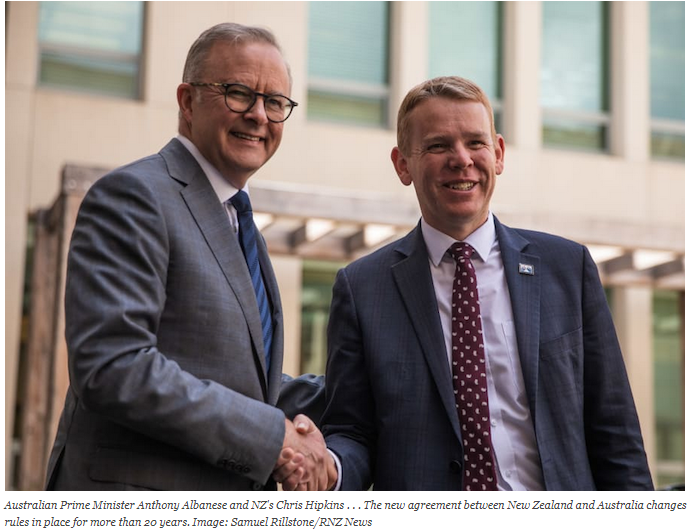Starting from 1 July 2023, New Zealanders who have lived in Australia for at least four years and who meet the standard criteria for Australian citizenship will be allowed to become Australian citizens. This will give them access to various services and benefits that were previously unavailable to them.
Children born to New Zealanders living in Australia will also automatically become Australian citizens at birth, rather than having to wait until they turn 10. The announcement was made by Australian Prime Minister Anthony Albanese on the 50th anniversary of the trans-Tasman travel arrangement between Australia and New Zealand, which allows citizens of each country to live and work in the other.
New Zealand Prime Minister Chris Hipkins has called the decision to allow direct pathway to Australian citizenship for New Zealanders living in Australia the “biggest improvement in the rights of New Zealanders living in Australia in a generation.” The decision will restore most of the rights that New Zealanders had in Australia before 2001, which were revoked at that time. Successive New Zealand prime ministers had advocated for this change for over two decades, and the decision brings the two nations closer together.
Hipkins is scheduled to meet with Albanese in Brisbane, where they will celebrate the new policy at a citizenship ceremony, timed to coincide with the 40th anniversary of the Closer Economic Relations deal between the two countries and ahead of Anzac Day on Tuesday. Hipkins says the changes will make a significant difference to the lives of many New Zealanders and their children by giving those who decide to take up Australian citizenship similar rights to Australians living in New Zealand.
New Zealanders who become Australian citizens can still retain their New Zealand citizenship. Hipkins says that these dual citizens will not be lost to New Zealand, but will instead draw the two countries closer together. The change will be retrospective, meaning New Zealanders on temporary, special category visas who arrived in Australia since 2001, had lived in Australia for at least four years, and met standard citizenship criteria would be included.
Australian Immigration Minister Andrew Giles says it is only fair that the opportunity to become an Australian citizen is made easier for their closest friends and allies. The new pathway to Australian citizenship for New Zealanders does not have a minimum income requirement or health requirement, and will cost $490 AUD.
The new policy also applies to New Zealand citizens from the states and territories within the Realm of New Zealand (the Cook Islands, Niue, and Tokelau). Before 2001, New Zealanders on Special Category visas could access social security and obtain Australian citizenship without first becoming permanent residents. However, under a 2001 rule change, New Zealand citizens who arrived in Australia after February 26 that year could not access some social security payments, obtain citizenship, or access other rights and privileges without first successfully obtaining permanent residence through Australia’s migration program.
There are limits on New Zealand citizens in Australia receiving the Australian age pension, disability support pension, and carer payment. New Zealand citizens who arrived in Australia after 26 February 2001 may not access the National Disability Insurance Scheme, despite being required to pay the Medicare levy, which partially funds the scheme. Until recently, New Zealand citizens could not access Australian student loans, although they were eligible to pay domestic, instead of international, fees. New Zealanders’ eligibility for Australian student loans was changed in 2016, with limitations. To access a student loan in Australia, a Kiwi needs to have entered as a dependent minor under 18 and have ordinarily lived in Australia at least eight of the previous 10 years, among other criteria.





